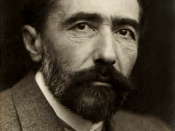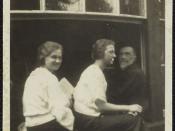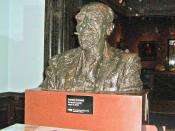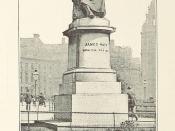According to Merrion-Webster Inc. Dictionary, a doppelgänger is a double, an often ghostly or evil counterpart to a character. It comes from the German language, doppel- double + -gänger goer. It might be asked, "What does a doppelgänger have to do with a paper on Joseph Conrad?" The answer is a lot, especially if Conrad's "The Secret Sharer" is being discussed. In this short story, the two characters, the captain and Leggatt, share many similarities, as well as differences. When comparing the similarities and differences, they can be used to show the duality between the captain and Leggatt. Conrad used Leggatt as a doppelgänger to help the captain come terms with himself.
In 1880, Conrad was part of the crew of the Cutty Sark. On this ship, Sidney Smith killed a black man, John Francis. The captain of the Cutty Sark secretly helped Smith to an American ship, the Colorado.
Four days later, Smith committed suicide (Daleski 171). Smith had not wanted to be tried for his murder. This experience is particularly interesting when one compares it to Conrad's short story, "The Secret Sharer". Conrad directly used his knowledge of the occurrences aboard the Cutty Sark for that particular story.
"The Secret Sharer" is a psychological masterpiece that dramatizes the act of sympathetic identification with an outlaw. Also, it deals with the achievement of self-mastery when the secret self is exorcised (Graver 150). In it, the character Leggatt is the embodiment of the captain's personality; yet, he is not any higher or lower than the captain. He's only different. He is one side, to a double-sided coin.
In the story, the captain of a ship discovers a man named Leggatt.
Leggatt had committed murder on the Sephora, on which he was first mate. Not wanting to face a trial, he escaped. The captain and Leggatt form an immediate bond (Conrad 702). Comparing the two, they are both of the same stature, same background. The captain even refers to Leggatt as his "double", "other self", or "secret sharer" almost 40 times (Graver 152). Conrad specifically implies that Leggatt is a doppelgänger, or the captain's double.
They do, however, possess striking differences in their personalities. Where the captain is apprehensive and uncertain of himself, Leggatt is full of calmness and self-confidence (Conrad 702). In fact, part of the attractiveness that Leggatt has, is based on his obvious self-possession (Graver 152). Yet, it must be remembered that Leggatt killed a man. That gave him a very sinister quality. The evil quality of the captain's doppelgänger become obvious very quickly.
In the 1940s, R.W. Stallman insisted that Leggatt represents the captain's moral consciousness and the world that lies below the surface of our conscious lives (Graver 151). If that is true, we can see that the evil in the captain is really characterized in Leggatt. It is not evident to others that the captain is evil, but he accepts the idea of the evilness in Leggatt. When he acknowledges the sin that Leggatt committed, he's acknowledging his own potential criminality (Daleski 172). In the same way, the good qualities of Leggatt are a part of the captain. They are simply a part of the captain that is buried.
When the time comes for Leggatt to leave, the captain sees how that is beneficial, but he regrets the thought of losing the person he confides in. Because of his personality, the captain benefited greatly from Leggatt. He inspired him to act boldly and assert himself. It was something the captain needed to be a good commander. The captain realizes that he can and does measure up to the "ideal conception of ones own personality that every man sets for himself secretly" (Graver 153).
It is evident that when Conrad wrote this short story, he had the idea of a doppelgänger in mind. His repetitive use of certain terms only adds to the conclusion that Leggatt is indeed the reflection of the captain's self. That doesn't mean that he doesn't exist in his own right, it just means that because of his personality, he was in direct contrast to the captain. The ability of Conrad to portray Leggatt as a doppelgänger might stem from the experiences he went through as a young child. Whatever, the reason, Conrad's pessimistic view of life was obvious (A.I.P.C. online) Conrad took part in many voyages all over the world. He truly enjoyed the life he led as a sailor. In 1880 he passed his examination for second mate. In 1886 earned his British citizenship and his master mariner's certificate. Conrad remembered his experiences at sea and later used them in his novels and short stories (NYU online).
The style in which Conrad wrote was very romantic, yet grim. He was driven by many doubts and was obsessed with a dark vision of human experience. This became a constant for him (Pinsker 54). Conrad was described as being aristocratic, cold, unapproachable, and a whiner who leaned on his friends for advice, criticism, and money (Pinsker 54). When he wrote, he stripped his characters of any romantic illusions they, themselves, might have had. He made them acknowledge the dark monsters of their subconscious. Conrad also really cared about language and words and he was deeply committed to thinking (Pinsker 58). That is very obvious when you look at his works. They're filled with illusions and well thought out images: "a green cadaverous glow" and "ghastly, silvery, fishlike" (Conrad 702). Perhaps, the reason for his pessimism stemmed from his early life and the situations surrounding his childhood.
In the 1860s, the hope of the peasantry in Russia and the surrounding area was that they were on the verge of a bloody revolt against the nobility and the autocracy (Freeze 192). Revolution was on the minds of many. By 1863, Poland began a revolution against Russia that would sadly end in failure (Polonia online). After the defeat, Tsar Nicholas "Russified" everything. The leaders of the revolution where tried for treason and killed. Other fighters of independence were sought out and sent into exile, most to Siberia (Polonia online/Jean- Aubry 26). The people lost hope.
It was just six years before this turmoil that Teodor Józef Konrad Korzeniowski was born. The date was December 3, 1857 and the place was Terechowa, Poland, near Berdichev. His parents were Apollo Nalecz Korzeniowski and Evelina Bobrowski. Apollo was a patriotic poet who was greatly esteemed for his translations of Shakespeare. Joseph's mother was a well-born gentle woman who suffered from frail health, but had a keen mind. When Joseph was five years old, his father was arrested. Both of his parents had been strongly active in the effort to win Polish independence from Russia (Coolidge 19). But, instead of being sentenced to exile in Siberia, Apollo was sent to Vologda. Evelina requested to go with him and was allowed, but only if she too became a political prisoner (Jean-Aubry 26). After three years, Evelina died from the hardships.
In 1868, Apollo and Joseph were both allowed to go to Lemberg, Galicia. Then, in 1869, they moved to Cracow. It was here that Apollo died. Joseph was 11 years. After this, a deep sadness settled in Konrad. An undercurrent of melancholy marks a large amount of his adult writing. This is undoubtedly the reason why he later viewed life with such pessimism.
After the death of his father, Joseph was given into the care of his maternal grandmother. His uncle, Tadeusz Bobrowski, was in charge of his education. When Joseph set his heart on being a sailor, his uncle sent him to Europe with a tutor, with the hope that it would knock some sense into him. However, after traveling through Italy and Switzerland, he decided never to return to his father's homeland (Greenhills online). He fulfilled his dream of becoming a sailor.
Conrad seriously began his writing four years after he had left the sea. His influence on later novelists has been profound. He is the novelist of man in extreme situations. "Those who read me," he wrote in his preface to A Personal Record, "know my conviction that the world, the temporal world, rests on a few very simple ideas; so simple that they must be as old as the hills. It rests, notably, among others, on the idea of Fidelity (A.I.P.C. online). For Conrad, fidelity is the barrier man erects against nothingness, against corruption, against the evil that is all about him, waiting to engulf him, and that in some sense is within him unacknowledged. But what happens when fidelity is submerged, the barrier broken down, and the evil without in acknowledged by the evil within? At his greatest, that is Conrad's theme. The captain finally recognized the evil within him when Leggatt, his doppelgänger, left. When he does so, he also finds the piece of himself that he needed to become a real commander on his ship. In other words, when he came to terms with the evil in himself, he transformed the destruction of "self" into the discovery of self (Daleski 171)






